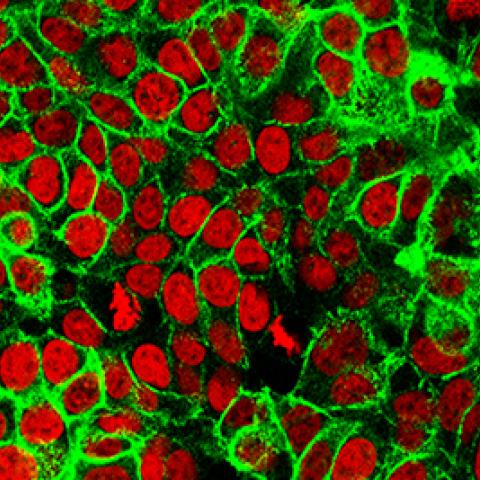
Colon cancer cells.
Patients with previously treated colorectal cancer that has spread only to the liver may be eligible to participate in a new clinical trial at the NIH Clinical Center.
Colorectal cancer (CRC) starts in the colon and/or rectum and often metastasizes, or spreads, to many sites in the body. In a certain set of patients, however, CRC metastasizes only to the liver. Jonathan Hernandez, M.D., of the Surgical Oncology Program, is studying how well CRC patients with liver-only metastases respond to treatment with a hepatic artery infusion pump (HAIP) that is surgically implanted under the skin. Unlike systemic chemotherapy, where drugs travel through the bloodstream to all parts of the body, the HAIP sends anticancer drugs through an artery directly into the liver. The HAIP allows for higher doses of chemotherapy drugs to be given while also reducing the drugs’ side effects. Investigators aim to see if this treatment will slow the growth of liver metastases and prolong survival in this set of CRC patients.
Clinicaltrials.gov identifier: NCT03366155
NCI Protocol ID: NCI-18-C-0024
Official Title: A Single-Arm Phase II Study of Hepatic Artery Infusion Pump Chemotherapy With Floxuridine and Dexamethasone in Combination With Systemic Chemotherapy for Patients With Colorectal Cancer Metastatic to the Liver
The Center for Cancer Research is NCI’s internal cancer center, a publicly funded organization working to improve the lives of cancer patients by solving important, challenging and neglected problems in cancer research and patient care. Highly trained physician-scientists develop and carry out clinical trials to create the medicines of tomorrow treating patients at the world’s largest dedicated research hospital on the campus of the National Institutes of Health in Bethesda, Maryland.
For more information on CCR clinical trials click here, and subscribe to have the latest CCR clinical trials sent directly to your inbox.

